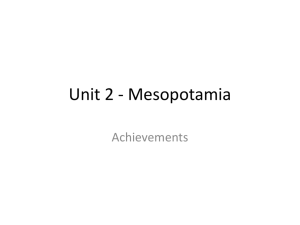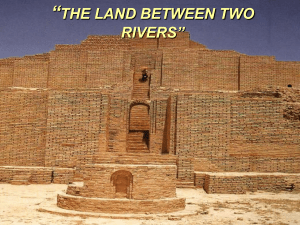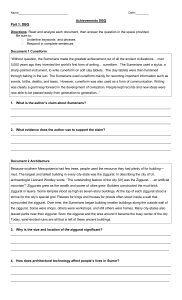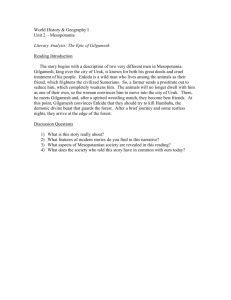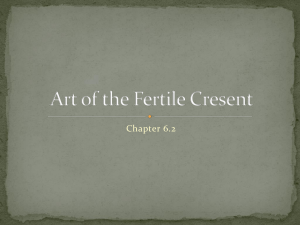Mesopotamia
advertisement
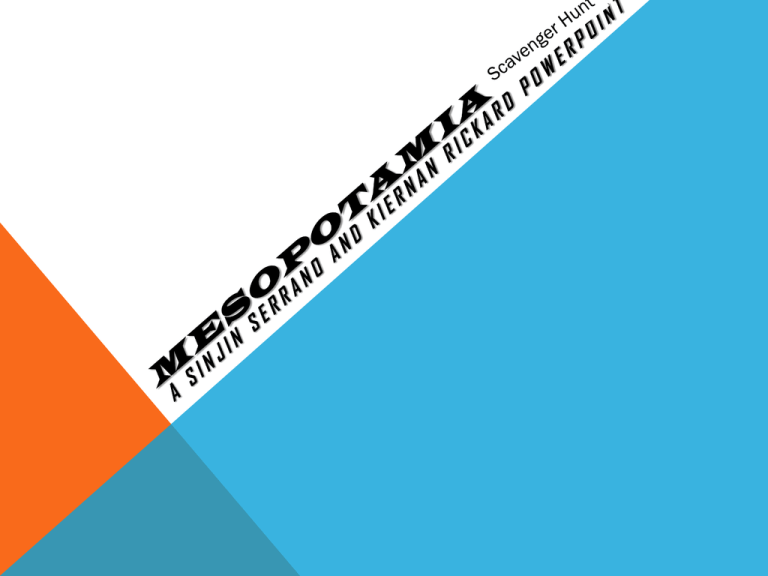
QUESTION ONE Why were river valleys the first place for complex societies (civilizations) to develop? What are the advantages of residing in a river valley? First of all, they easily found fresh drinking water via the river. The wildlife and vegetation gave them food sources. Plus, it was a great place to trade because traders just had to sail up the river to Mesopotamia. It was also good for agriculture because the land was fertile in Northern Mesopotamia. QUESTION TWO Explain how farmers were able to control seasonal floods and bring water to their fields. By digging ditches and canals, famers could redirect water to their plantations. Not only are they building irrigation systems by that, but they are actually making sure that the rivers don’t overflow, or flood. QUESTION THREE The ancient Sumerians moved from pictographs to cuneiform (logograph) - what is cuneiform? What is a rebus? Why was it so important to develop a writing system? Definition of Cuneiform from Dictionary.com: 1. composed of slim triangular or wedge-shaped elements, as the characters used in writing by the ancient Akkadians, Assyrians, Babylonians, Persians, and others. Definition of Rebus from Dictionary.com: 1. a representation of a word or phrase by pictures, symbols, etc., that suggest that word or phrase or its syllables: Two gates and a head is a rebus for Gateshead. It was important because people can communicate from distances, as well as having written laws. QUESTION FOUR Learn at least 3 inventions the Sumerians founded and 3 mathematical ideas. How do we use these inventions today? Inventions 1. Wheel 2. Frying Pans 3. Plow Mathematics 1. Based on the number 60, i.e. 60 minutes in an hour, 60 seconds in a minute QUESTION FIVE Read the story of Gilgamesh, one of the first recorded stories in world history. What is your favorite part of the story and why? KIERNAN: My favorite part of the story is when Gilgamesh and Enkidu made up and were friends after the fight and went off into the forbidden forest. SINJIN: I liked it when Gilgamesh explained his problems. QUESTION SIX What is a ziggurat and what was its function? If you had to construct a miniature model of a ziggurat, what would you use and why? Ziggurats are temples. The ancient Sumerians believed that the gods lived in the sky, so they built temples with steps leading up to the top. The top is where they had ceremonies. Also, people would leave offerings. Ziggurats were built at the center of the town. If we were to build a miniature ziggurat, I would use stone because it is not combustible and because it will stay stable. QUESTION SEVEN Who was this Hammurabi guy? What kind of leader was he? Why was his Code so important? Why do you think his reign was called "The Golden Age of Babylon"? And why did he need 282 laws? Hammurabi was a leader. He was good because he created the first set of laws and bring justice and the rights to people. It was called that probably because agriculture and trading grew. We needed at least 282 laws most likely because people would try to find loopholes. QUESTION EIGHT Who developed a way to use iron weapons within their armies? What culture learned (stole) this technique and made weapons even better? The Hittites developed iron weapons, but the Assyrians took the technique and made it so only the tip of the weapons are iron, to make it lighter. QUESTION NINE One of the 7 Wonders of the Ancient World is in Babylon. What is it? Why was it constructed? It was the hanging gardens. Apparently, the Babylonian King, King Nebuchadnezzar II, built to please his homesick wife because she missed the trees and plants of her homeland.


